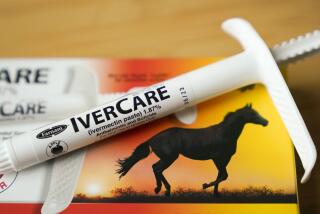Heckler Rejects Emergency Ban on Antiobiotics in Animal Feed
- Share via
WASHINGTON — Health and Human Services Secretary Margaret M. Heckler refused on Wednesday to impose an emergency ban on the use of antibiotics in animal feed, saying scientific evidence does not support a finding of “imminent hazard” in the practice.
She denied a petition filed by the Natural Resources Defense Council, which sought the ban on use of small amounts of penicillin and tetracycline.
The NRDC contended that the routine, low-level use of antibiotics in animal feed is allowing drug-resistant bacteria to enter the human food chain, weakening the ability of drugs to fight human disease.
Heckler’s decision does not end the matter permanently. The Food and Drug Administration still can ban antibiotics in animal feed through administrative regulations.
But that could take an additional two or three years or more, on top of the more than eight years the issue has already been under review at the FDA. The NRDC had sought to shorten the process by asking the secretary to declare an “imminent hazard” to public health, which would invoke emergency powers and allow an immediate ban.
In its petition, the NRDC contended that 100 to 300 deaths and 270,000 non-fatal cases of salmonella poisoning may occur each year because use of the antibiotics have let hardier disease bacteria into the food chain.
But Mrs. Heckler said an FDA analysis of the NRDC petition failed to support the allegation.
The dispute involves small amounts of antibiotics that are routinely added to animal feeds to fatten animals more quickly and protect them from herd diseases.
Many scientists believe the constant, low-level exposure to antibiotics kills off weaker, vulnerable strains of bacteria and leaves stronger, drug-resistant bacteria-- so-called “superbugs”--in their place.
More to Read
Sign up for Essential California
The most important California stories and recommendations in your inbox every morning.
You may occasionally receive promotional content from the Los Angeles Times.










